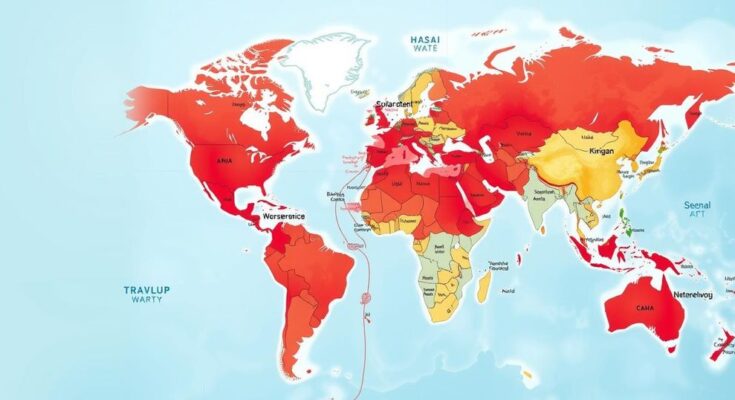The US government has issued a Level 4 “Do Not Travel” advisory for 20 countries, warning of severe safety risks including armed conflicts, terrorism, and political instability. Affected nations include Ukraine, Afghanistan, Venezuela, and many more. The advisory highlights the implications for travelers and tourism, urging individuals to prioritize safety and consult updated travel guidelines. Travel companies are encouraged to adapt and promote safer destinations as global risks continue to rise.
The United States government has issued a stringent “Do Not Travel” advisory for 20 countries due to severe safety concerns and threats to American citizens abroad. The advisory, categorized as Level 4—the highest risk level—encourages travelers to prioritize safety and avoid these regions. Countries identified in this advisory include Russia, North Korea, Iran, Iraq, Ukraine, Afghanistan, Belarus, Syria, Lebanon, Libya, Somalia, Sudan, Venezuela, and Yemen. This advisory is a response to increasing geopolitical tensions, political instability, and threats posed by civil unrest and armed conflicts.
The risks associated with traveling to these countries predominantly stem from ongoing military conflicts, terrorism, civil turmoil, and significant infrastructural deficiencies in emergency services and healthcare. For instance, Ukraine continues to face challenges due to the ongoing conflict with Russia, while countries like Yemen and Syria contend with severe and persistent civil wars. Additionally, regions like Iraq and Somalia are plagued by threats from extremist groups, further exacerbating travel safety concerns.
The implications of this advisory extend beyond individual travelers to the global tourism industry. Economies of countries that heavily depend on tourism, including Lebanon and Venezuela, may suffer setbacks due to decreased international arrivals. Travel plans are expected to shift towards safer destinations, thus affecting airlines and hospitality sectors within the high-risk regions. Moreover, travel insurance policies could experience revisions, leading to increased costs or exclusions for high-risk countries.
Travelers are urged to rigorously evaluate safety information and consult the US State Department’s Travel Advisory platform before making travel arrangements. They should consider securing travel insurance that covers emergencies in these destinations while heeding all government warnings related to non-essential travel. Additionally, having contingency plans, including emergency contacts and evacuation strategies, is advisable for safety.
Travel companies must also adapt by promoting safer destinations, offering flexible booking options, and utilizing technology to provide travelers with timely updates regarding safety conditions. This advisory serves as a crucial reminder of the importance of personal safety amidst a backdrop of growing global risks caused by geopolitical disputes and public health emergencies. As international travel gradually resumes in a post-pandemic world, enhancing safety protocols and rebuilding public trust remain paramount for both the industry and travelers.
Looking ahead, the collaboration between governments, travel companies, and international institutions will be vital in creating a safer travel environment. By addressing emerging risks and fostering trust, the travel industry may navigate the complexities of global travel while ensuring the welfare of its clientele.
In light of ongoing geopolitical tensions and increasing safety concerns, the US government has taken significant steps to inform and protect its citizens by issuing travel advisories. These advisories are critical in guiding travelers about potential risks in various regions worldwide, reflecting not only the current political climate but also the factual safety conditions faced by travelers abroad. The designation of a country as a Level 4 destination indicates serious hazards that American citizens might encounter while traveling there, emphasizing the need for caution and informed decision-making.
In conclusion, the recent US advisory to refrain from traveling to 20 countries underscores the heightened global risks faced by travelers today. The comprehensive assessment of safety concerns reveals the impact of political unrest, terrorism, and inadequate emergency services on international travel. The travel industry must respond by prioritizing safety, enhancing communication, and prioritizing customer welfare. Through collaboration between governments and industry stakeholders, a framework for safer travel can be established, ensuring that the needs of tourists and the realities of global risks are effectively managed.
Original Source: www.travelandtourworld.com




